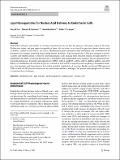Lipid Nanoparticles for Nucleic Acid Delivery to Endothelial Cells
Author(s)
Liu, Gary W.; Guzman, Edward B.; Menon, Nandita; Langer, Robert S.
Download11095_2023_Article_3471.pdf (1005.Kb)
Publisher with Creative Commons License
Publisher with Creative Commons License
Creative Commons Attribution
Terms of use
Metadata
Show full item recordAbstract
Abstract
Endothelial cells play critical roles in circulatory homeostasis and are also the gateway to the major organs of the body. Dysfunction, injury, and gene expression profiles of these cells can cause, or are caused by, prevalent chronic diseases such as diabetes, cardiovascular disease, and cancer. Modulation of gene expression within endothelial cells could therefore be therapeutically strategic in treating longstanding disease challenges. Lipid nanoparticles (LNP) have emerged as potent, scalable, and tunable carrier systems for delivering nucleic acids, making them attractive vehicles for gene delivery to endothelial cells. Here, we discuss the functions of endothelial cells and highlight some receptors that are upregulated during health and disease. Examples and applications of DNA, mRNA, circRNA, saRNA, siRNA, shRNA, miRNA, and ASO delivery to endothelial cells and their targets are reviewed, as well as LNP composition and morphology, formulation strategies, target proteins, and biomechanical factors that modulate endothelial cell targeting. Finally, we discuss FDA-approved LNPs as well as LNPs that have been tested in clinical trials and their challenges, and provide some perspectives as to how to surmount those challenges.
Date issued
2023-02-03Department
Koch Institute for Integrative Cancer Research at MIT; Massachusetts Institute of Technology. Department of BiologyPublisher
Springer US
Citation
Liu, Gary W., Guzman, Edward B., Menon, Nandita and Langer, Robert S. 2023. "Lipid Nanoparticles for Nucleic Acid Delivery to Endothelial Cells."
Version: Final published version